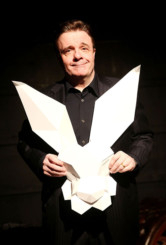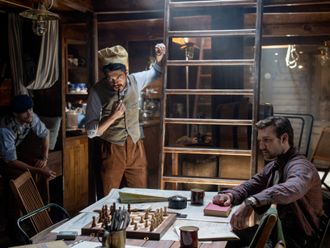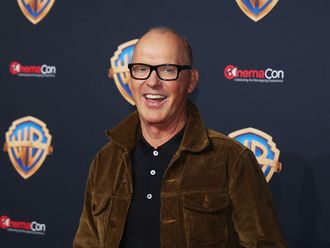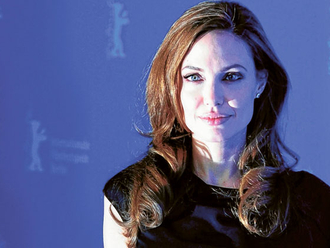
Nathan Lane knows how to make an entrance, and this is not just a cliche but an understatement. Bursting forth variously over the years in pinstriped suit, in Roman tunic, or in Barbara Bush jumbo faux pearls and softly curled wig, he has earned perhaps the best perk of Broadway stardom: a welcoming round of applause from Jane and John Q. Public.
So what was he doing on a recent Monday night, arriving on stage as a disembodied voice coming out of an old-timey telephone? (One you actually talk on.)
Lane plays the cynical, cantankerous editor Walter Burns in a new revival of Ben Hecht and Charles MacArthur’s voluble 1928 newspaper comedy, The Front Page, at the Broadhurst Theatre on West 44th Street. That he doesn’t appear in the flesh until the bottom of the second act, in a production that co-stars the Johns Slattery and Goodman and runs almost three hours, frankly delights him.
“I’m jumping on a speeding train — they all have a head start,” Lane said not long before curtain on a recent Monday, sitting in a back room of Joe Allen, the Midtown restaurant beloved by the theatre crowd.
He seemed to be hiding behind the stiff moustache he grew for the part. “I mean, it’s a great character. And he sort of takes over the play till the end, the big Shakespearean finale, when things resolve and everything pays off in a wonderful way.”
At 60, Lane is enjoying a sense of resolution and payoff. He has been married for almost a year to Devlin Elliott, a playwright and producer he dated for almost two decades. “Married life is great,” he said, after ordering some mineral water and vegetable soup. “Nothing major, nothing dramatic. It’s a very subtle change.”
The ceremony took place at city hall, with the comedian Mike Birbiglia and his wife, Jen Stein, another producer, as witnesses.
“I had thought, ‘OK, we’ll do this, and we’ll go have lunch,’” Lane said. “And then I started to say those words that you’ve heard in a thousand movies, and Devlin was fine, and I could barely get the words out. I got very, very emotional. It really got me.”
Like many actors — heck, like many people — Lane had a difficult childhood, with his father, a truck driver, drinking and dying young and his mother suffering a mental breakdown.
He was born Joseph Lane and chose his name from the Guys and Dolls character Nathan Detroit, whom he ended up playing on Broadway in the musical’s acclaimed 1992 revival.
Commercials
Growing up in Jersey City, New Jersey, he had two nurturing older bothers and found solace in farce (the first Broadway show he saw was Peter Shaffer’s Black Comedy, with Michael Crawford and Geraldine Page) and the past.
“You know, when I was young, I was fascinated by the Algonquin Round Table, by all those witty alcoholics,” he said, with a rueful laugh. “With all their personal problems, and yet they’re all writers, they’re all incredibly complicated.”
Unable to afford college despite a scholarship, Lane moved to New York in the fall of 1977, when the city was just turning itself around from the Ford to City: Drop Dead years. He did summer stock and commercials, “thousands of them.” He delivered singing telegrams, including one to an Italian wedding. “You know you’ve hit a new low when accordion players are heckling you,” Lane said. But the guests asked him to stay, and laughed uproariously at his jokes.
“They threw money,” he said, with faint wonderment still. “Dollar bills.”
Following in the tradition of Laurel and Hardy, Abbott and Costello and the less-remembered Clark and McCullough, Lane formed a stand-up duo with a friend named Patrick Stack. Stack and Lane went to Los Angeles, played the Comedy Store, opened for rock bands. “As an actor, you’re dependent on people casting you, and in this case we had a product,” Lane said, slurping some soup.
The act broke up after he got a job on the sitcom “One of the Boys,” with Mickey Rooney, a yet undiscovered Dana Carvey, and Meg Ryan in a recurring part. After the show flopped, Lane got his big Broadway break, with George C. Scott in a revival of Noel Coward’s Present Laughter. He played “an aspiring young provincial playwright fond of leaping onto couches and giggling loonily,” as Frank Rich put it in The New York Times, adding that he “alternately hits and overshoots his broad mark”.
Lane spoke with nostalgia of an era when “there was sort of a friendlier vibe” between these creatures and playwrights, exemplified by the venerable Elliott Norton of Boston encouraging Neil Simon to add the Pigeon Sisters to the last act of The Odd Couple. And of the old days when a company could tinker with a show out of town, as Lane himself did with Simon and Laughter on the 23rd Floor, before John and Jane Q. could record damning snippets and post them on the internet.
Collaborations
Lane, who also reprised the role of Oscar Madison with his co-star in The Producers, Matthew Broderick, has written the introduction to a forthcoming edition of Simon’s memoirs. “His editor said, ‘You know, if you ever want to write your’ — ha, ha — ‘memoir,’” he said. “Well, no. I’m not doing that.”
His work as an author has been limited to his collaborations with his husband, Elliott, on a children’s book series, Naughty Mabel, about the insouciant French bulldog with whom they share an apartment in Tribeca and a house in East Hampton, New York.
Perhaps disappointingly for those who relish Lane’s dexterity with a one-liner, there is no script of his own languishing in a drawer.
“I mean, I like making contributions, I’m a great punch-up man,” he said, twirling an imaginary cigar. “But it’s hard. They don’t like you to change job titles.” (As evinced, perhaps, by the cool reception he received for his version of Stephen Sondheim and Burt Shevelove’s adaptation of Aristophanes’ The Frogs.) “I would lean more toward directing. Everyone keeps saying I have to direct something because I’ve got a lot of opinions.”
Although The Front Page is funny, preview audiences have been gasping at some of its speeches and, once Lane walks on stage, his tough love of Slattery, who plays the reporter protege, Hildy Johnson.
After various makeovers over the years — Cary Grant and Rosalind Russell in His Girl Friday; Burt Reynolds and Kathleen Turner in Switching Channels — Hecht and MacArthur’s work, about the framing of a white convict who killed a black policeman, has been fully restored to its naughty, bro-mantic glory.
“There’s never been a more politically incorrect play,” O’Brien said. “It’s misogynistic. It’s everything. And appallingly isn’t very different from our own time.”
It was “the play that uncorseted the American theatre with its earthy, two-fisted vitality” according to Tennessee Williams.
“Because it was considered so profane and vulgar on a certain level,” Lane said at Joe Allen. “They don’t write ‘em like this anymore. People will go, ‘Oh, Jesus, no one would produce this.’ Even though it’s one set, so many things happen, people crashing through windows.”













